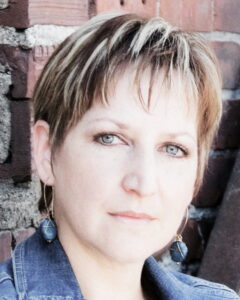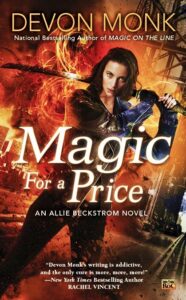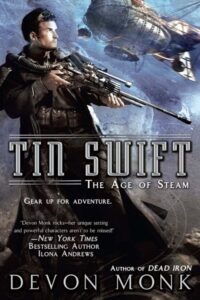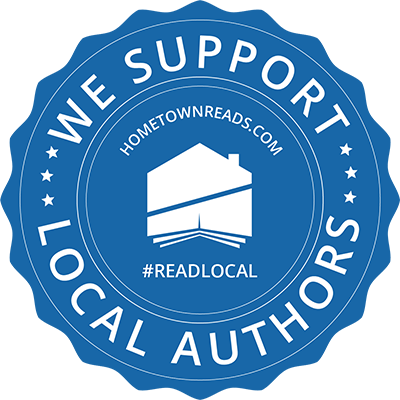Devon and I first met when I asked her to write a story for my anthology, Fantasy Gone Wrong. She wrote “Moonlighting” for me, and I’ve been a fan of her stories ever since. She is such a warm, kind person and a very talented author. We’re pleased to have her as our guest today. 🙂

Devon Monk writes the Allie Beckstrom urban fantasy series, the Age of Steam steampunk series, and the occasional short story. She has one husband, two sons, and a dog named Mojo. She lives in Oregon and is surrounded by colorful and numerous family members who mostly live within dinner-calling distance of each other. She has sold over fifty short stories to magazines and anthologies in five different countries, including a Year’s Best Fantasy collection. When not writing, Devon is either knitting strange things, remodeling the house-that-was-once-a-barn, or hosting a family celebration. Visit her online at: www.devonmonk.com or www.deadlinedames.com
WD: Has your family always been supportive?
DM: My family has always been supportive of my writing. But you know, writing as a career doesn’t follow a by-the-book (ha! Pun!) career path with easily definable markers. Writing for a living took me down many different roads before it became something that paid the bills on a regular basis. And while my family was always supportive of me, I think they were even more excited when the job I’d been pursuing for seventeen years turned into a full-time paying gig.
WD: How did you get started with the blog at Deadline Dames?
DM: I had just sold the first three books in the Allie Beckstrom urban fantasy series, and was starting to “meet” other urban fantasy writers online through various blogs and such. Some of my agency mates and I tossed around the idea of a group blog and started the Deadline Dames.
WD: What are your favorite types of posts?
DM: Although I love talking about writing and my process, my favorite posts are the ones where readers get excited and leave comments. Those are usually the posts that cover everything from our hobbies, to our favorite TV shows, to books we are currently reading.
WD: What do you enjoy about it most?
DM: I love the interaction with readers and fellow writers. I also love having a little spot on the net where I can celebrate successes and commiserate during hard times with eight other terrific writers. Something I didn’t expect when we started blogging together was how close we’ve come together as friends. The Dames are fantastic about offering support, advice, and sympathetic ears when any of us are dealing with challenges. I can not say this enough–the Dames are terrific writers and the kind of women I’m proud and honored to call friends.
WD: Do you and the other writers see a lot of crossover from readers by doing the blog together?
DM: We do have readers who follow one Dame and try out another Dame’s books, which is always very cool. Sometimes when we gush over an author we love, we’ll have that author’s fans come check us out and give us a try. It’s all about being honest and sharing the things you love.
WD: What drives you to write short stories in so many different genres?
DM: In my opinion short fiction is a free ticket to risk wildly. I love exploring story structure, style, and concept, and pushing what I think I am capable of writing whenever I write. Short fiction allows me to do all that in a small space and in (hopefully) less time, which feels very rewarding.
WD: Which of your own novels has been your favorite to work on? Or was the most difficult novel to research?
DM: I’ve loved working on all of my novels, though I’ll admit the steampunk series takes a lot more research than the urban fantasy series, and therefore writes more slowly for me. TIN SWIFT, my latest steampunk, felt like it wrote excruciatingly slowly as I watched my deadline tick down. But when I went back to read it, I was surprised to find it read really fast, with lots of action and pep.

WD: What are your favorite events to attend?
DM: I love big group signings where the energy is high and a lot of people come to the store or convention to browse every book in the place. Smaller signings can be a lot of fun too, and offer a more intimate one-on-one time to talk with readers, which I love.
I think conventions are a lot of fun. Every one is so different I try to sample them all!
Every year I try to attend my local SF/F/H convention. Other types of conventions I’ve enjoyed are steampunk conventions, World Fantasy, WorldCon, romance conventions, comic conventions, writing conferences, and even Book Expo of America.
I attend as a professional guest at some conventions. At others, I just go for the fun of meeting new people, listening to speakers, and immersing myself in all the wonderful aspects of being a writer, reader, and fan.

WD: What marketing have you/your publisher done for your latest release, Tin Swift?
DM: The most unusual thing I did was write a serialized short story, HANG FIRE, that took place between book one DEAD IRON and book two, TIN SWIFT. It was told in twenty short chunks–a little like a radio show–through my two point-of-view characters, picking up where DEAD IRON ended and ending where TIN SWIFT began.
We lined up twenty blogs to each host a piece of the story and offered prizes at each stop. I had a great time writing HANG FIRE, the bloggers liked having original, exclusive material, and readers seemed to enjoy the experience. I think it all went well.
WD: Have you belonged to a writer’s critique group? How has it helped your career?
DM: I have belonged to several critique groups. Some of them were on-line, some were in-person.
The critiques I received over the years were always very helpful, but the surprising thing about critique groups was how much more I learned when I was asked to critique someone else’s story.
The great thing about a critique group is that it allowed me to look at other writers’ stories with a critical eye to see what worked and what didn’t work for me. To give a critique I hoped would be helpful to the writer (whose goal was to publish said story) I would have to explain my experience as a reader, point out where and how the story faltered, and then offer suggestions for what I thought might make the story stronger for me.
Taking apart hundreds, maybe thousands of stories in that way, while listening to other writers do the same all around me (and to me) really helped me understand different ways a story can be built, and different ways an audience can respond to the same story. Critique groups opened my eyes to many wonderful stories and gave me a chance to glimpse the gears beneath the magic.
Thank you, Devon, for taking the time out of your day to be with us today! We wish you the best of success with your writing.
Please feel free to ask questions or post a comment for Devon. Thank you! 🙂



I have to agree that I learn as much from being critiqued and doing the critique. I am in a small critique group and we meet once a month. Even when it isn’t “my turn”, reading and then hearing the critiques of the group I learn jut as much, if not more, than when I have my piece up for critique.
One thing I will say on the critique group is that everyone needs to be on the same page in that they need to take the suggestions and do what they want with them and argue about it. We had someone in the group who was very defensive about their work being critiqued, it really taught me how I don’t want to act in the group. I do take everyone’s suggestions, sometimes they fit in with what I am trying to do, sometimes not.
Lisa
Lisa,
Oh, yes, I agree. The best critique groups I’ve belonged to had a set of rules for conduct and critique which were closely followed.
It is up to the author to decide (usually in private) whether or not to use any part of the critique given.
Arguing isn’t helpful to the author or the critiquer or the group. Asking questions: “did you get that I was alluding to that by mentioning the lamp?” is fine. Defensiveness is not.
One way we looked at critique was it revealed how a reader (audience) reacts to the story without the author’s interference. After all, the author can’t sit next to every person who reads their story and explain what they meant to say.
🙂
Devon
I was wondering if Devon might be able to recommend a critique group in Salem, OR. I have been looking for a local one to attend, and so far, have not had much luck. I’m looking for one who would be willing to critique urban fantasy/paranormal romance writing.
HI Aleta,
Good question. Right now, I know of two crit groups in Salem. One meets at Gov. Cup, but is closed (I’ve actually only heard of this group, I don’t know the members) and the other is an open group that meets at Clockwork Cafe on Sundays.
I believe a chapter of RWA still meets here in town too (maybe check on line?) I visited them once maybe three years ago. It wasn’t a critique group, but I thought some of the members might be writing paranormal romance.
If these groups don’t fit for you, have you thought about starting your own group? Contact me via email on my web page if you want and we can talk.
–Devon